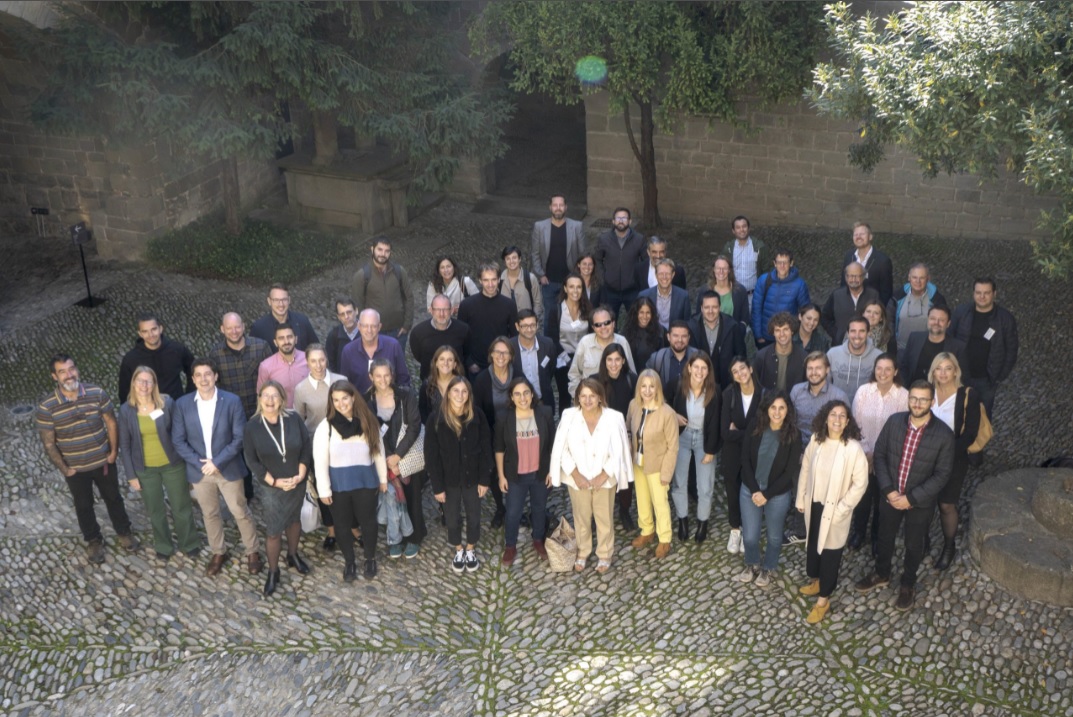WATER-MINING develops the next-generation water resource solutions
One year after WATER-MINING project's kick-off, the consortium, of which ICTA-UAB is member, held a three-day meeting (25-27th October 2021), bringing together the project’s 38 partners from 12 countries across Europe for the 1st plenary and hybrid meeting in Hotel Món Sant Benet, in Sant Fruitós de Bages (Barcelona, Spain), to discuss new innovative water sources and their related energy, environment and economic costs.

Innovative solutions to the world’s most pressing issues will come about as a result of effective collaboration, communication and knowledge exchange. Research has shown that bringing people together from different backgrounds and disciplines can elevate the potential for relevant innovations to be effectively applied at the local level, as well as upscaled and diffused. As such, leaders of each of WATER-MINING's 11 work packages and case study owners were present at the consortium meeting to collaborate and discuss clear strategies to reflect the different needs of water users and share the progress made during the first year working together. This demonstrated a high commitment to action-driven progress for a circular economy, especially considering the COVID-19 challenges.
Communities of Practice (CoPs) are a vital component of the EU-funded project WATER-MINING, to deliver tailored solutions co-created by a diverse group of individuals to ensure the long-term success of technologies and innovations developed and tested in project case studies. Within the WATER-MINING H2020 project, the Universitat Autònoma de Barcelona (UAB) is guiding case study (CS) leaders to design and implement CoPs in their sites to engage local stakeholders from various areas of expertise, and to incorporate social values and concerns into the process of technological development. Each CoP enables the participants to discuss, work together and outline the steps towards successful design and implementation of water-related technologies and www.watermining.eu 2 innovations. Furthermore, participants in the CoPs benefit from learning from each other and developing relationships with local partners, co-creating tangible technologies and innovations for a water-wise world.
The three-day meeting allowed partners to discover the innovative technologies that EURECAT is preparing to establish within the WATER-MINING project at their case study in La Llagosta, Spain (CS5). Also, this site visit allowed partners to see the infrastructure at EURECAT’s headquarters in Manresa (Spain), and offered time to share the development of the project’s other five case studies demonstrating how the recovery of secondary materials from seawater and urban and industrial wastewater is possible, including energy and water fit-for purpose, and to delve into the progress of the two citizen engagement environments (Living Labs) located in the Plataforma Solar de Almeria (Spain) and the Floating Farm in Rotterdam (the Netherlands).
WATER-MINING CoPs tackle the legal aspects of water management technology such as the legal/regulatory barriers and opportunities in EU and national regulations for water reuse, use of recovered materials, amongst others. Moreover, the CoPs also explore how social perceptions and barriers to using recovered water and materials can affect the uptake of these technologies. CoPs also facilitate discussion on the requirements (e.g. in relation to quality) for the use and reuse of products (water, recovered material), as well as their purpose. Citizen engagement also plays a crucial role in establishing bonds between science and society based on trust, two-way dialogue, and long-term thinking. WATER-MINING involves a wide range of activities and practices that aim to make scientific research more participatory and accessible, facilitating the engagement of citizens through workshops, the use of augmented reality tools, and the curation of exhibitions across Europe. WATER-MINING's public engagement programme is planned to start in autumn 2022. Alongside NEMO Science Museum, SciCo and Parque de la Ciencias will conduct citizen engagement dialogue workshops and activities with at least 100 participants per country (the Netherlands, Cyprus/Greece and Spain). NEMO will exhibit the WATER-MINING modular exhibition at the Studio location in Amsterdam, De Studio - NEMO Science Museum. Throughout 2022, NEMO will host a temporary exhibition on energy and sustainable development. The WATERMINING modular exhibition will be featured and given visibility in through its promotional activities in the coming year.
The Parque de las Ciencias will exhibit the WATER-MINING modular exhibition in Granada (Andalusia, Spain). This exhibition will partly coincide with a 1,000 m2 exhibition about biomimicry, produced by the Parque de las Ciencias as part of another project between four partners carrying out science education through exhibitions (Tekniska, Stockholm; Dasa, Dortmund; Technisches Museum Wien). www.watermining.eu